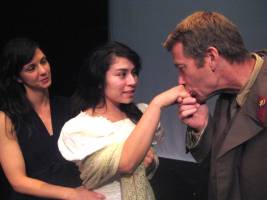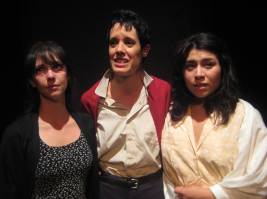NOT RECOMMENDED
At the risk of alienating the many who consider Anton Chekhov one of the world’s greatest playwrights, I must preface this review with a confession. I am not now, nor am I likely to become, a Chekhov fan. Having seen one or two productions each of his four greatest works, I have come to the conclusion that the author of The Cherry Orchard, The Seagull, The Three Sisters, and Uncle Vanya is simply not my cup of tea—or should that be vodka? Therefore, any Chekhov lovers reading this review should take whatever I say about Three Sisters Or Perestroika with a grain of salt. By the same token, those with a similar lack of affinity for the very talky Russian may want to pass on Pavel Cerny’s 1980s adaptation of Chekhov’s ode to Moscow.
Cerny’s decision to set The Three Sisters in the early years of Mikhail Gorbachev’s restructuring of the Soviet political and economic system has definite merit, transforming Olga, Masha, and Irina into women who even today would be only in their early to mid fifties. References to Chernobyl, AIDS, and The Beatles will also likely strike a chord, at least with those over forty.
On the other hand, some may question transforming Olga into a lesbian (in appearance and manner only). Likewise, a decision to turn a duel into a fight may well make sense in a 1980s context, but even in the Soviet Union under Gorbachev, it’s doubtful that men “challenged” each other to “a fight,” and even less likely that a mere fight would end up with one combatant dead and no one particularly surprised by the outcome.
The cast assembled at the Whitefire Theatre cannot be faulted for whatever misgivings I have about Three Sisters Or Perestroika. Noelle Messier, Olga Konstantulakis, and Evelyn Lorena do commendable work as the Prozorov girls, as do Kyle Maloney and Kelly Kemp as their brother Andrei and his ditzy wife Natasha (the latter of whom provides the production’s few moments of humor). Don Baldaramos, Nic d’Avirro, Mark Deliman, Andrew Hernon, David Jerard, John Klopping, and Kevin J. Ryan are fine too as the men in the Three Sister’s lives, with Angela Grillo and Mark Leland completing the cast as servants.
Still, for this reviewer at least, neither a competent cast nor a committed director have been able to breathe any kind of life into two and a half hours of words, words, and more words, particularly words that sound at best unnatural to contemporary ears and at worst downright stilted, at least in the translation being used here. (Since no translator is credited in the program, it seems reasonable to guess that Cerny’s adaptation is either his own translation, or one in the public domain.) Though translations from the Russian or the French or the German are tricky by nature, it’s still possible that a more modern one might make the language sound less stilted. (Several new translations have debuted in the past decade.) The cast assembled at the Whitefire do their darnedest to make their lines sound colloquial, but stilted language is stilted language, no matter how you say it, especially when there’s so much of it. (It’s no wonder, then, that Maloney’s adlibbed reference to his sisters as “You guys” stuck out like a sore thumb.)
Theatergoers accustomed to the caliber of scenic designs found in the top tier of Los Angeles intimate theaters will find Three Sisters Or Perestroika’s barebones by comparison. Shayla Kundera’s set consists merely of furniture and rugs on a black-floored, black-walled, black-curtained stage, plus accompanying props. On the other hand, Kundera’s costumes are a well-chosen bunch and Corey Dunn’s light design is artful. Charles Maynes sound design is only competent; e.g., the second act is supposed to take place during a street carnival, but nary a sound penetrates the Prozorov home. Black-and-white slides open each act, providing vivid images of the Soviet Union during the play’s 1980s timeframe.
Chekhov lovers may end up with a far more favorable impression of Three Sisters Or Perestroika than the highly personal one expressed above. Having seen all four of the playwright’s Greatest Hits, though, I think it’s likely that this reviewer will declare a moratorium on all things Chekhovian, at least for the foreseeable future.
Whitefire Theatre, 13500 Ventura Blvd., Sherman Oaks.
www.theatermania.com
–Steven Stanley
May 8, 2011
Photos: Mark Deliman




 Since 2007, Steven Stanley's StageSceneLA.com has spotlighted the best in Southern California theater via reviews, interviews, and its annual StageSceneLA Scenies.
Since 2007, Steven Stanley's StageSceneLA.com has spotlighted the best in Southern California theater via reviews, interviews, and its annual StageSceneLA Scenies.







 COPYRIGHT 2025 STEVEN STANLEY :: DESIGN BY
COPYRIGHT 2025 STEVEN STANLEY :: DESIGN BY